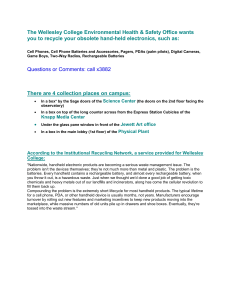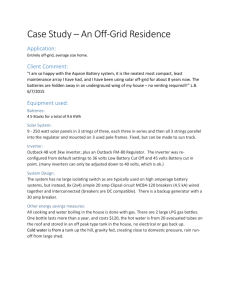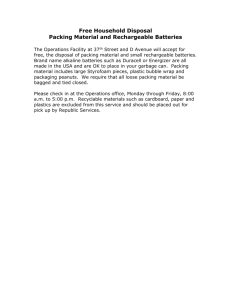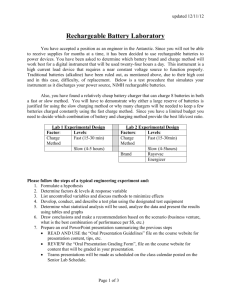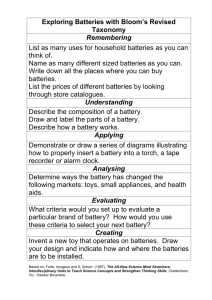These criteria do not include solar lamps working without any battery
advertisement
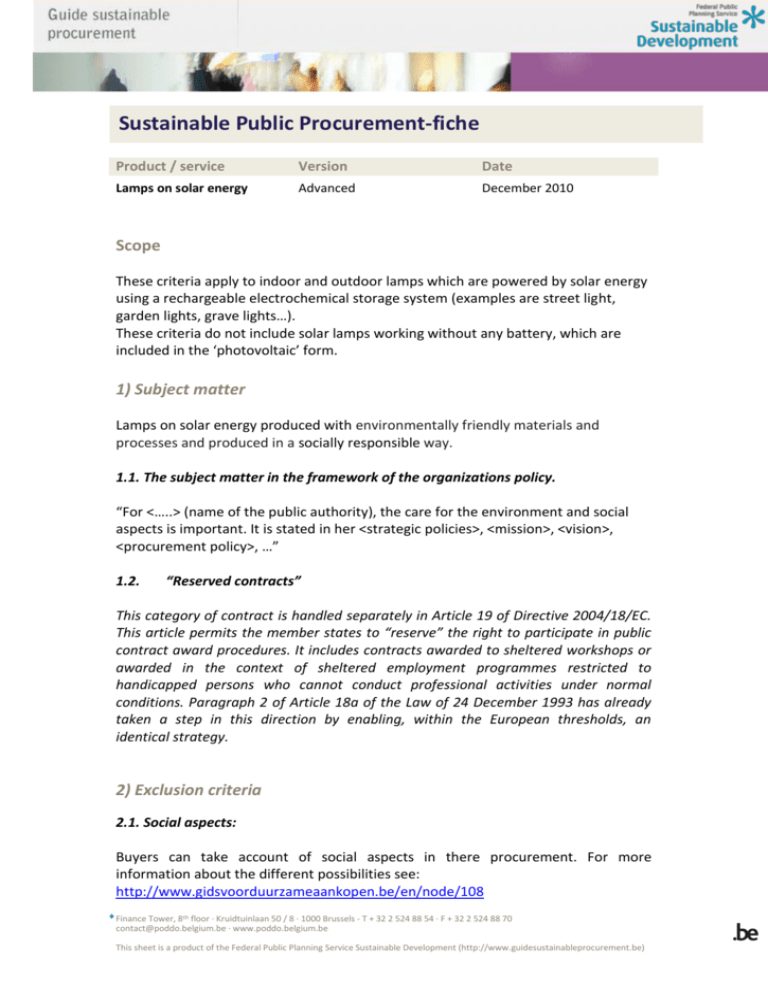
Sustainable Public Procurement-fiche Product / service Version Date Lamps on solar energy Advanced December 2010 Scope These criteria apply to indoor and outdoor lamps which are powered by solar energy using a rechargeable electrochemical storage system (examples are street light, garden lights, grave lights…). These criteria do not include solar lamps working without any battery, which are included in the ‘photovoltaic’ form. 1) Subject matter Lamps on solar energy produced with environmentally friendly materials and processes and produced in a socially responsible way. 1.1. The subject matter in the framework of the organizations policy. “For <…..> (name of the public authority), the care for the environment and social aspects is important. It is stated in her <strategic policies>, <mission>, <vision>, <procurement policy>, …” 1.2. “Reserved contracts” This category of contract is handled separately in Article 19 of Directive 2004/18/EC. This article permits the member states to “reserve” the right to participate in public contract award procedures. It includes contracts awarded to sheltered workshops or awarded in the context of sheltered employment programmes restricted to handicapped persons who cannot conduct professional activities under normal conditions. Paragraph 2 of Article 18a of the Law of 24 December 1993 has already taken a step in this direction by enabling, within the European thresholds, an identical strategy. 2) Exclusion criteria 2.1. Social aspects: Buyers can take account of social aspects in there procurement. For more information about the different possibilities see: http://www.gidsvoorduurzameaankopen.be/en/node/108 Finance Tower, 8th floor · Kruidtuinlaan 50 / 8 · 1000 Brussels - T + 32 2 524 88 54 · F + 32 2 524 88 70 contact@poddo.belgium.be · www.poddo.belgium.be This sheet is a product of the Federal Public Planning Service Sustainable Development (http://www.guidesustainableprocurement.be) 3) Technical capacity / 4) Market information / 5) Technical specifications For this product group there is, at present (December 2010), just one eco-label available which forms the basis for formulating environmental compliance criteria. A list showing the criteria taken from the specifications document for this eco-label is given below. Buyers may include these criteria in the technical specifications of their own tender documents. Alternatively, they may give them a more optional character by incorporating them as awarding criteria in the tender, all this depending on the procedure that’s chosen. In addition, the PODDO has divided a list (see below) into key criteria and other criteria. The first group is definitely recommended when ordering green and sustainable products in the case of public procurement contracts. KEY-CRITERIA: a) Product requirements (Blaue Engel) - The battery must be exchangeable and this in a way that allows the customer to exchange it by use of ordinary tools. The product description must include detailed instructions on how to exchange the battery. For batteries which have to be exchanged by trained personnel the product description must name corresponding customer service representatives. b) Warranty (Blaue Engel) - Applicant’s warranty on the product shall cover all modules or components. It includes the performance of all functions described in the product description for at least two years. The rechargeable battery shall be covered by a warranty of at least of six months. c) Requirements for rechargeable batteries: ban on Cadmium (Blaue Engel) - If the appliances are equipped with rechargeable batteries the applicant shall undertake to only use cadmium-free batteries in accordance with the Council Directive 2006/66/EC(1) on Batteries and Accumulators Containing Certain Finance Tower, 8th floor · Kruidtuinlaan 50 / 8 · 1000 Brussels - T + 32 2 524 88 54 · F + 32 2 524 88 70 contact@poddo.belgium.be · www.poddo.belgium.be This sheet is a product of the Federal Public Planning Service Sustainable Development (http://www.guidesustainableprocurement.be) Dangerous Substances and include a clear notice requiring the use of a cadmium-free exchange battery into the product description. (1) http://eur-lex.europa.eu/LexUriServ/LexUriServ.do?uri=OJ:L:2006:266:0001:0014:en:PDF d) Other Material Requirements (Blaue Engel) - No chloroparaffins may be added to the carrier material of printed circuit boards. e) General Functional Safety Requirements (Blaue Engel) - This shall include information on the restrictions to functional safety due to unfavourable conditions of use (e.g. orientation and tilt angle of the module, shading). For ascertaining the functional safety of the product the manufacturer shall determine the appliance’s energy needs, possibly by taking a typical energy consumption profile into account. Such consumption profile shall be based on the basic functions of the product and the average use of significant additional functions. f) Supplementary functional safety requirements for Mobile products: charging time (Blaue Engel) - Mobile products with a flexible range of use are products designed so as to allow a change of location. It must be possible to almost fully charge within 10 hours (≥ 90% of the charge capacity specified by the charger manufacturer) solar chargers as well as selfsustaining photovoltaic products with integrated or proper rechargeable batteries. g) Plastics used in Cases and Case Parts (Blaue Engel) - The plastics must not contain as constituent parts any substances classified as: Carcinogenic, mutagenic or reprotoxic in categories 1 or 2 according to Table 3.2 of Annex VI to EC Regulation 1272/2008(1) persistent, bioaccumulative and toxic (PBT substances) or very persistent and very bioaccumulative (vPvB substances) according to the criteria of Annex XIII to the REACH Regulation or particularly alarming for other reasons and included into the List (so-called list of candidates) set up in accordance with REACH, Article 59, paragraph 1 (2). - The following shall be exempt from this rule: Plastics used in films covering the back of the solar panel; Process-related, technically unavoidable impurities; Fluoroorganic additives (as, for example, anti-dripping agents) used to improve the physical properties of plastics, provided that they do not exceed 0.5 weight percent; Plastic parts weighing less than 25 grams. (1) (2) http://eur-lex.europa.eu/LexUriServ/LexUriServ.do?uri=OJ:L:2008:353:0001:1355:en:PDF http://echa.europa.eu/consultations/authorisation/svhc/svhc_cons_en.asp Finance Tower, 8th floor · Kruidtuinlaan 50 / 8 · 1000 Brussels - T + 32 2 524 88 54 · F + 32 2 524 88 70 contact@poddo.belgium.be · www.poddo.belgium.be This sheet is a product of the Federal Public Planning Service Sustainable Development (http://www.guidesustainableprocurement.be) h) Supplementary functional safety requirements for Stationary Outdoor Products (Blaue Engel) - - - Stationary outdoor products are products which are primarily used in outdoor environments and usually stationarily mounted. They must provide a minimum level of functional safety indicated by the solar fraction data. The solar fraction indicates the portion of the solar energy used - which is provided via solar generator and storage system - in the product’s or the consumer’s total energy demand. The following categories have been established: Products required to provide a 100 % solar fraction; e.g. fence chargers and/or safety-related installations. Products required to provide a minimum solar fraction of 98 %; e.g. house number lights. The product description shall specifically inform about possible capacity losses when used on a North-facing house wall. The imprint on a solar-powered house number light must still be clearly readable from a distance of 10 m after a luminous period of 12 hours during darkness. Products required to provide a minimum solar fraction of 95 %; e.g. gardening lights, grave lights. The product description shall, in an appropriate manner, inform about the dependence of the luminous period on seasonal irradiance conditions. i) Supplementary functional safety requirements for Mobile products: battery protection (Blaue Engel) - The following requirements shall be met to protect the battery from overheating, overcharge and deep discharge: • Solar module and battery shall be thermally separated from each other by design or technical measures. • Charging electronics shall make sure that the integrated, proper or recommended batteries are activated during operation in accordance with the battery manufacturer’s specifications. OTHER CRITERIA: a) Rechargeable batteries: overcharge or deep discharge (Blaue Engel) - A proper coordination of the components or an electronic charging system has proved to be efficient in protecting the rechargeable battery form overcharging or deep-discharging. The applicant shall verify that the product includes such features. Evidence: The compliance with all the criteria mentioned above can be proved with the following label: Finance Tower, 8th floor · Kruidtuinlaan 50 / 8 · 1000 Brussels - T + 32 2 524 88 54 · F + 32 2 524 88 70 contact@poddo.belgium.be · www.poddo.belgium.be This sheet is a product of the Federal Public Planning Service Sustainable Development (http://www.guidesustainableprocurement.be) <<<<< >>>> <<<<<Blaue Engel>>>> In case that the tendering company can present this label, any further proof is not necessary. Any other suitable evidence from a recognized body can also be used. 6) Awarding the contract: Criteria --- For example --1 Price Weight e.g. 60% Calculation (e.g.): Lowest offered price/ stated price x 0,60 2 Environmental criteria e.g. 35% (The public authority formulates the points it wants to assign to the below mentioned criteria ) Calculation (e.g.): Total scored points / maximum number of points x 0,35 3 4 … … e.g. 5 % e.g. …. In above mentioned table, the weight of the environmental criteria shall be stated by the buyer in function of its particular procurement. Representatives of several sectors federations mention often to not underestimate this weight to give sustainability in the awarding phase a chance at all. The environmental criteria in the above mentioned table concern the following issues: see point 5 - 7) Performance clauses: 7.1. Environmental aspects: a) Rechargeable batteries: overcharge or deep discharge (Blaue Engel) Finance Tower, 8th floor · Kruidtuinlaan 50 / 8 · 1000 Brussels - T + 32 2 524 88 54 · F + 32 2 524 88 70 contact@poddo.belgium.be · www.poddo.belgium.be This sheet is a product of the Federal Public Planning Service Sustainable Development (http://www.guidesustainableprocurement.be) - The product description shall inform about the durability-relevant, battery specific risks. If applicable, the product description shall also include proper countermeasures to restore or maintain the capacity of the rechargeable battery. b) Disposal Instructions (Blaue Engel) - The product description shall include the following instructions in an easily readable form (similar wording may be used): • ... all batteries should, in principle, be returned to the proper return facility for used batteries; Batteries must not be disposed of with household waste. • The appliance contains a cadmium-free rechargeable battery. The product description shall also include information on where to return rechargeable batteries – i.e. - first and foremost - the location (address) of the return facility for rechargeable batteries. c) Consumer Information (Blaue Engel) - The product description shall provide the following consumer information in addition to the requirements to be verified: • Charging time for full charge (100%) in hours with reference to the specified capacity of the battery charger or the nominal capacity of the integrated or proper or recommended rechargeable batteries. • The resulting respective average charging time for 1 Ah. 7.2. Social aspects: Buyers can take account of social aspects in there procurement. For more information about the different possibilities see: http://www.gidsvoorduurzameaankopen.be/en/node/108 7.3. Ethical aspects: “The tenderer undertakes, until the contract has been executed in full, to respect the 8 Basic Conventions of the ILO: 1. The prohibition of forced labour (C29 Forced Labour Convention, 1930, and C105 Abolition of Forced Labour Convention, 1957); 2. The right to freedom of association (C87 Freedom of Association and Protection of the Right to Organise, 1948); 3. The right to organise and collective bargaining (C98 Right to Organise and Collective bargaining, 1949); 4. The prohibition of any discrimination in terms of labour and remuneration (C100 Equal Remuneration, 1951 and C111 Discrimination (Employment and Occupation), 1958); Finance Tower, 8th floor · Kruidtuinlaan 50 / 8 · 1000 Brussels - T + 32 2 524 88 54 · F + 32 2 524 88 70 contact@poddo.belgium.be · www.poddo.belgium.be This sheet is a product of the Federal Public Planning Service Sustainable Development (http://www.guidesustainableprocurement.be) 5. The minimum age for child labour (C138 Minimum Age Convention, 1973), together with the prohibition of the worst forms of child labour (C182 Worst Forms of Child Labour Convention, 1999). The non-respect of this undertaking may, by virtue of Article 20, §1, 4° of the general specifications annexed to the Royal Decree of 26 September 1996, give rise to the application of the official measures described in § 6 of the same article, including unilateral termination of the contract.” References [Information of the public authority that used these clauses in a procurement case] Finance Tower, 8th floor · Kruidtuinlaan 50 / 8 · 1000 Brussels - T + 32 2 524 88 54 · F + 32 2 524 88 70 contact@poddo.belgium.be · www.poddo.belgium.be This sheet is a product of the Federal Public Planning Service Sustainable Development (http://www.guidesustainableprocurement.be)
